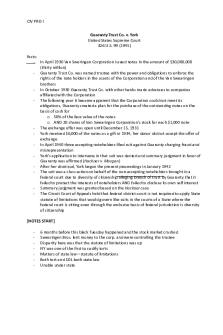A.P. Smith Mfg Co v. Barlow PDF

| Title | A.P. Smith Mfg Co v. Barlow |
|---|---|
| Course | Business Organization |
| Institution | Touro College |
| Pages | 2 |
| File Size | 67 KB |
| File Type | |
| Total Downloads | 42 |
| Total Views | 212 |
Summary
Case Brief Bus Org I...
Description
A.P. SMITH MFG. CO. v. BARLOW 13 N.J. 145, 98 A.2d 581, appeal dismissed, 346 U.S. 861 (1953) FACTS: Parties: Appellant: Barlow (Δ) Appellee: A.P. Smith (Π) Procedural History:
Chancery division found in favor of Π
Relevant Facts:
Π wanted to give Princeton $1,500 out of the corporation’s money
ISSUE:
Whether a charitable donation to a Princeton college was within the power of the directors despite a shareholder objection
PARTIES’ ARGUMENTS: Appellant:
Π certificate of incorporation does not expressly authorize the contribution
Under common law principals the company does not possess any implied or incidental power to make it
NJ statutes which expressly authorize the contribution may not constitutionally be applied to the Π
Appellee:
Corporate contributions are a sound investment and the public expects corporations to aid philanthropic and benevolent institutions
Contributing creates good will and a business friendly environment
Contributing to a college furthers the self-interest in assuring properly trained personnel for administrative and other corporate employment
DISPOSITION OF THE COURT:
Affirmed
RULE OF LAW:
Those who managed the corporations could not disburse any corporate funds for philanthropic or other worthy public cause unless the expenditure would benefit the corporation
HOLDING:
A charitable donation to Princeton is within the discretion of the corporate directs even against the wishes of a minority shareholder
COURT’S REASONING:
Under NJ law a donation in excess of 1% of the capital stock required 10 days’ notice to stockholders and approval at a stockholders’ meeting if written objections were made by the holders of more than 25% of the stock Where justified by the advancement of the public interest the reserved power may be invoked to sustain later charter alterations even though they affect contractual rights between the corporation its stockholders The public policy supporting the statutory enactments is greater and the alteration of preexisting rights of stockholders much lesser Nothing indicating the donation was made in furtherance of personal rather than corporate ends...
Similar Free PDFs

A.P. Smith Mfg Co v. Barlow
- 2 Pages

Page v smith
- 1 Pages

Talmage v Smith- torts
- 2 Pages

Employment Division v. Smith
- 1 Pages
![[2.5] SMith v Littlewood](https://pdfedu.com/img/crop/172x258/6n3e77jwyr54.jpg)
[2.5] SMith v Littlewood
- 5 Pages

Smith v. hughes
- 4 Pages

Dick Bentley v Harold Smith
- 1 Pages

Smith v Tamworth City Council
- 3 Pages

Smith V Hughes - Case Analysis
- 6 Pages

Guaranty Trust Co. v. York
- 4 Pages

Pennsylvania Coal Co. v. Mahon
- 2 Pages

Midler v Ford Motor Co
- 4 Pages

Drennan v. Star Paving Co.
- 2 Pages

Richmond v. J.A. Croson Co
- 2 Pages
Popular Institutions
- Tinajero National High School - Annex
- Politeknik Caltex Riau
- Yokohama City University
- SGT University
- University of Al-Qadisiyah
- Divine Word College of Vigan
- Techniek College Rotterdam
- Universidade de Santiago
- Universiti Teknologi MARA Cawangan Johor Kampus Pasir Gudang
- Poltekkes Kemenkes Yogyakarta
- Baguio City National High School
- Colegio san marcos
- preparatoria uno
- Centro de Bachillerato Tecnológico Industrial y de Servicios No. 107
- Dalian Maritime University
- Quang Trung Secondary School
- Colegio Tecnológico en Informática
- Corporación Regional de Educación Superior
- Grupo CEDVA
- Dar Al Uloom University
- Centro de Estudios Preuniversitarios de la Universidad Nacional de Ingeniería
- 上智大学
- Aakash International School, Nuna Majara
- San Felipe Neri Catholic School
- Kang Chiao International School - New Taipei City
- Misamis Occidental National High School
- Institución Educativa Escuela Normal Juan Ladrilleros
- Kolehiyo ng Pantukan
- Batanes State College
- Instituto Continental
- Sekolah Menengah Kejuruan Kesehatan Kaltara (Tarakan)
- Colegio de La Inmaculada Concepcion - Cebu

